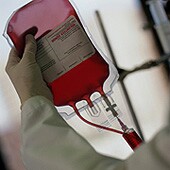In blood product transfusions BPAs, physicians justify overrides with wide range of rationales
WEDNESDAY, Jan. 14, 2015 (HealthDay News) — A wide range of physician-reported rationales drive overrides of best practice alerts (BPAs) for blood product transfusions, according to research published in the January issue of the Journal of Hospital Medicine.
Jonathan H. Chen, M.D., Ph.D., from the Stanford University Medical Center in California, and colleagues retrospectively reviewed provider-BPA interaction data (January 2011 to August 2012) from hospital electronic medical records. Two physicians also reviewed provider free-text responses to blood transfusion BPA prompts.
The researchers found that rationale for overriding blood transfusion BPAs was highly variable, with acute bleeding being the most commonly cited reason (>34 percent), followed by protocolized behaviors on specialty services (up to 26 percent) and “symptomatic” anemia (11 to 12 percent). Transfusions occurred in anticipation of surgical or procedural intervention (10 to 15 percent) or imminent hospital discharge (2 to 5 percent). The majority (55 percent) of providers interacting with BPAs were residents.
“With a wide swath of individually uncommon rationales for transfusion behavior, secondary use of electronic medical record databases and integrated clinical decision support tools are important to efficiently analyze common practice behaviors,” the authors write.
Copyright © 2015 HealthDay. All rights reserved.








